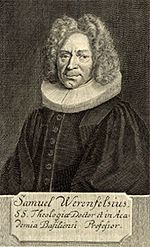Samuel Werenfels
Samuel Werenfels (born March 1, 1657 in Basel ; † June 1, 1740 ibid) was a Swiss Reformed theologian.
Life
Werenfels passed the exam as a candidate in theology in his hometown in 1677 and then went on a study trip to Zurich, Bern, Lausanne and Geneva. When he returned to Basel in 1685 he was appointed professor of the Greek language, only to go on a study trip again the next year, this time to Germany, Flanders and Friesland. After his return in 1687 he became professor of eloquence. In 1696 he moved up to the theological faculty and became professor of dogmatics and Dr. theol. , Professor of the Old Testament in 1703 and of the New Testament in 1711 . From 1696 to 1727 he also worked as a university librarian, in 1705 and 1722 as rector . In 1707 he became a member of the London Society for Promoting Christian Knowledge and in 1709 of the Berlin Academy of Sciences .
Work and meaning
Together with Jean-Alphonse Turrettini and Jean Frédéric Ostervald , Werenfels formed the so-called “theological triumvirate of Switzerland”, which, in contrast to strict Calvinism, prepared ideas of the Enlightenment and Pietism . He stood up for freedom of conscience and in 1723 achieved the lifting of the obligation to the orthodox formula consensus .
He introduced hermeneutics to the group of theological disciplines. About the Bible he said in an epigram :
- Hic liber est in quo quarit sua dogmata quisque,
- Invenit et pariter dogmata quisque sua.
- This is a book in which everyone seeks their own lessons
- And equally everyone finds their own teachings.
Werenfels emphasized the practical side of Christianity. His Dissertatio de logomachiis eruditorum (1692) is not only a radical scholarly criticism , but also a remarkable philosophical manifesto that profiles a new type of philosopher with world-changing aspirations. This definition found its way into the lexicons of the 18th century.
family
Werenfels' parents were Peter Werenfels (1627–1703), reformed pastor and later Antistes , and Margaretha Grynaeus (from an established Basel family of theologians). He remained unmarried and childless, but was the great-uncle of Samuel Werenfels (architect) (1720–1800).
literature
- Jakob Arnold von Salis : Werenfels, Samuel . In: Allgemeine Deutsche Biographie (ADB). Volume 42, Duncker & Humblot, Leipzig 1897, pp. 5-8.
- Karl Barth : Samuel Werenfels (1657–1740) and the theology of his time . In: Evangelical Theologie 1936, pp. 180–203.
- Erich Wenneker : Werenfels, Samuel. In: Biographisch-Bibliographisches Kirchenlexikon (BBKL). Volume 8, Bautz, Herzberg 1994, ISBN 3-88309-053-0 , Sp. 781-786.
- Rudolf Dellsperger : The Contribution of the ›reasonable Orthodoxy‹ to the inner-Protestant ecumenism, Samuel Werenfels, Jean-Frédéric Ostervald and Jean-Alphonse Turrettini as Union theologians . In: Ders .: Church fellowship and freedom of conscience. Studies on the history of churches and theology in Reformed Switzerland. Events, shapes, effects . Peter Lang, Bern a. a. 2001, pp. 51-65.
- Camilla Hermanin: Samuel Werenfels: il dibattito sulla libertà di coscienza a Basilea agli inizi del Settecento. Firenze, Olschki, 2003.
- Andreas Urs Sommer : A city between high orthodoxy and enlightenment. Basel in early modern transformation processes . In: Theologische Zeitschrift, Vol. 66 (2010), Heft 1, pp. 44-61 (extensively examines Werenfels' concept in the Dissertatio de logomachiis eruditorum )
Web links
- Publications by and about Samuel Werenfels in VD 17 .
- Werner Raupp : Werenfels, Samuel. In: Historical Lexicon of Switzerland .
| personal data | |
|---|---|
| SURNAME | Werenfels, Samuel |
| BRIEF DESCRIPTION | reformed theologian |
| DATE OF BIRTH | March 1, 1657 |
| PLACE OF BIRTH | Basel |
| DATE OF DEATH | June 1, 1740 |
| Place of death | Basel |
